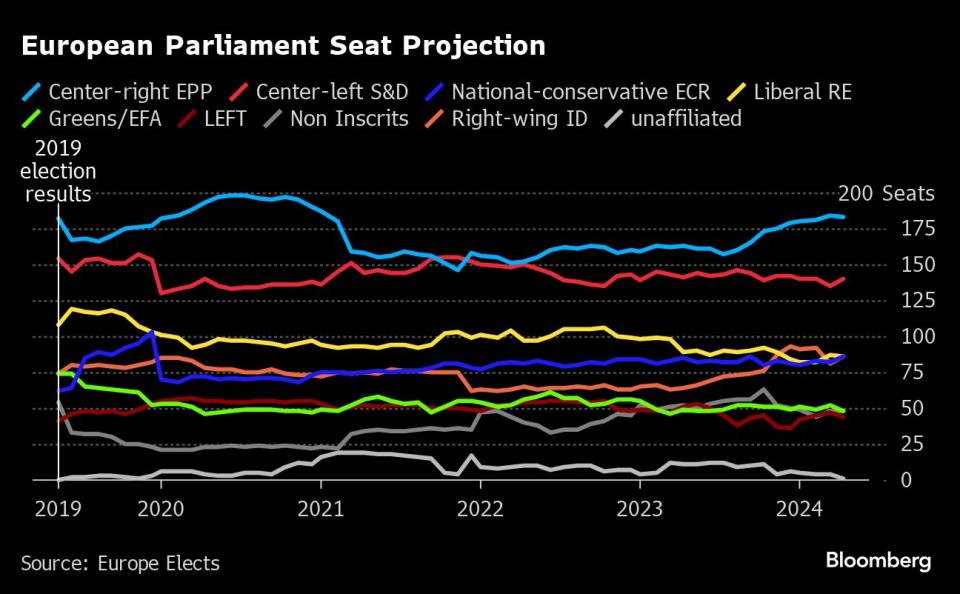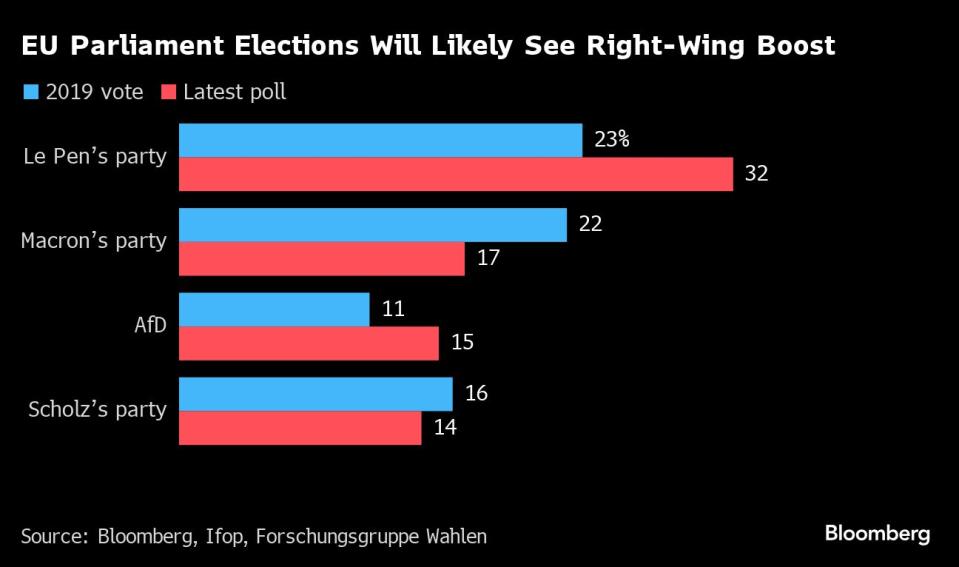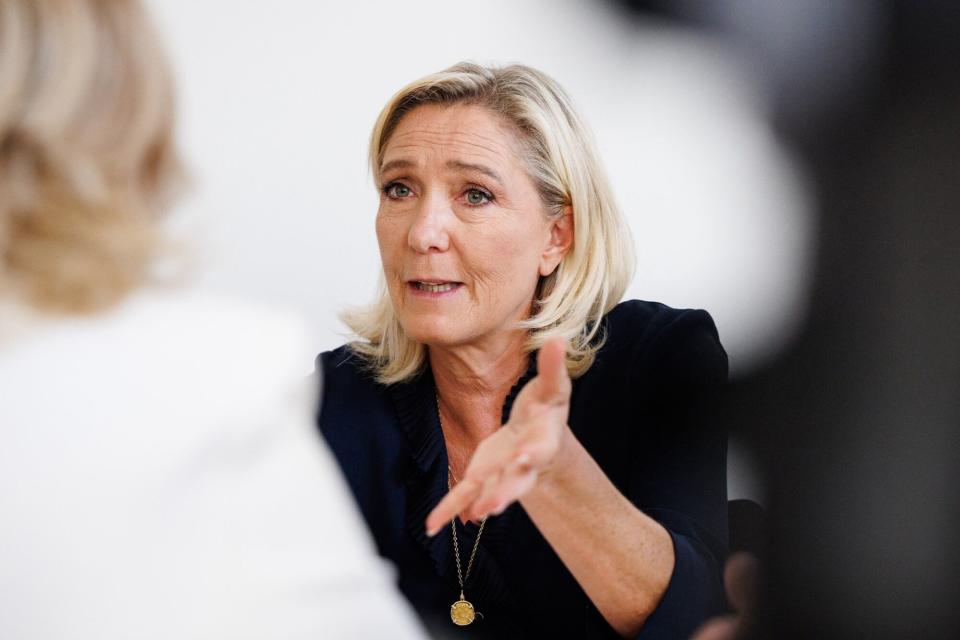Europe’s Far Right Battered by Scandal Ahead of Elections
(Bloomberg) -- Infighting among some of Europe’s most prominent far-right parties has thrown pre-election campaigning into turmoil, threatening to tarnish a parliamentary vote that was supposed to see ultra-conservative groups make major gains.
Most Read from Bloomberg
Marine Le Pen on Wednesday said her National Rally, or RN, would break ties with the Alternative for Germany after the AfD’s lead candidate said that not all members of the Nazi SS paramilitary organization were criminals.
In a further blow to the embattled German party, the Identity and Democracy alliance in the European Parliament, which includes RN, expelled the AfD after a vote among its members, ID said in a Thursday statement on the social media site X.
“This is real damage in the final stages of the election campaign,” Daniel Tapp, a spokesperson for AfD leader Alice Weidel, said in a statement.
“We remain confident that we will be able to continue working in a joint parliamentary group with our current partners after the European elections,” Tapp added. An ID spokesperson didn’t immediately respond to a request for comment.
The ruptures underscore one of the traditional problems faced by far-right parties — they don’t form a cohesive bloc and their many differences may outweigh their commonalities. This makes it even less likely a unified group will be able to emerge from the June 6-9 European elections with enough leverage to further a conservative agenda.
“These are all nationalist parties that don’t agree on much on the EU level except that they largely oppose the EU,” Jacob Kirkegaard, a senior fellow at the German Marshall Fund in Brussels, said in an interview. “They don’t like immigrants, they don’t like the EU, but what else do they agree on? Almost nothing.”
ID is projected to win 11.2% of the vote next month, according to a polling average compiled by Europe Elects. That would give the euroskeptic bloc 84 seats in the assembly, up from 59 at the last election.
But that projection is down from December when it appeared on track to win 93. And the recent AfD misstep wasn’t its first.
Maximilian Krah, the AfD’s lead candidate in the EU elections, was quoted last week by Italian newspaper la Repubblica making the comments which read as an exoneration of the Nazi SS.
He had already been under pressure after his assistant in the European Parliament was detained last month under suspicion of spying for China. On Wednesday, Krah quit the party’s leadership committee and said he would stop campaigning.
“This will surely have a negative effect on the election results,” Kirkegaard said. “People like winners, and the right-wing parties don’t look like winners right now. The populist appeal of right-wing parties can develop very quickly, but it can also disappear very quickly again.”
In its statement expelling the AfD from its group, ID said it “no longer wants to be associated with the incidents involving Maximilian Krah.”
Far-right groups had hoped to be able to form a big enough bloc after next month’s European elections that they could water down ambitious climate regulations and propose tougher measures on immigration.
One of their main proponents has been Prime Minister Viktor Orban, whose 14 years of uninterrupted rule in Hungary made him a standard bearer of far-right ideology in Europe and beyond.
But Orban too is now beset with problems after a scandal involving a child sex-abuse case earlier this year toppled his key allies, including the country’s president.
With an upstart former regime insider capitalizing on the political moment, the upcoming ballots for Orban are more about holding on to domestic support than any grand plans he once had of uniting far-right European parties under one political umbrella.
Read more: Why Eyes Are on the Far Right in European Elections: QuickTake
The largest group in the EU parliament — the center-right European People’s Party — is polling at 23%, a share that would grant it 183 seats.
The center-left S&D is projected to win 140 seats, while centrist-liberal group Renew is projected to get 86. That would comfortably give the three parties an absolute majority in the chamber, allowing them to block proposals from the far right.
The vice-president of Le Pen’s National Rally, Louis Aliot, said this week that his party doesn’t share the “same vision of the world” as the AfD, and that the current composition of coalitions is unlikely to persist beyond the elections.
“This certainly spells trouble for the far right as it illustrates the extent to which the extremism of some parts of the AfD could go,” Simone Tagliapietra, a senior researcher at the Bruegel think tank in Brussels, said in an interview. “This could cast a shadow on the overall far-right front and scare part of the potential electorate.”
Russia’s war in Ukraine has also served to split the right, with many parties, including the AfD and Orban’s Fidesz group, sympathetic to the Kremlin. Others, like Le Pen and Italian Prime Minister Giorgia Meloni have stood behind Ukraine.
The rift in the far right could also serve national interests, as Le Pen looks toward France’s 2027 election, when Emmanuel Macron is unable to run because of term limits. Her National Rally party currently has a double-digit lead in the polls.
“Le Pen doesn’t really care much about the European Parliament,” Kirkegaard said. “She only cares about positioning herself to win the next presidential election in France. For her, the chance to distance herself from a German right-wing party, which has sympathies for the Waffen-SS, is a gift.”
That means that even if the far right perform in line with expectations, their failure to find a common agenda could hamper their ability to follow through in Brussels.
“Unity has always been one of the main problems,” Dave Sinardet, a professor of political science at the Free University of Brussels, said in an interview.
--With assistance from Zoe Schneeweiss, Lyubov Pronina, Ania Nussbaum and Zoltan Simon.
(Updates with ID statement in the third paragraph.)
Most Read from Bloomberg Businessweek
The Dodgers Mogul and the Indian Infrastructure Giant That Wasn’t
A Hidden Variable in the Presidential Race: Fears of ‘Trump Forever’
©2024 Bloomberg L.P.





